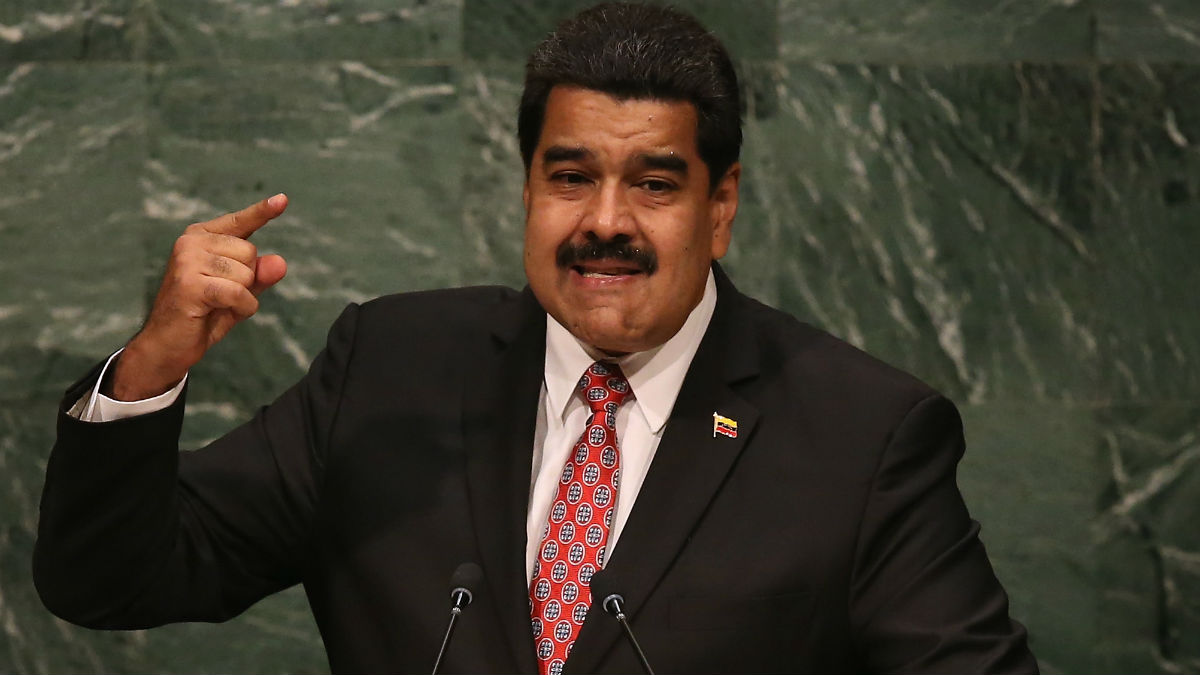Boost for campaign to oust Venezuela's Maduro
Poll suggests 64 per cent of country would vote to remove embattled leader

A free daily email with the biggest news stories of the day – and the best features from TheWeek.com
You are now subscribed
Your newsletter sign-up was successful
Opponents of Venezuela's embattled President Nicolas Maduro have completed the first phase of their campaign to remove him.
The country's election board announced yesterday that the opposition had collected double the 200,000 petition signatures required to force a recall referendum that could lead to Maduro leaving office.
The timing of any future referendum is crucial. If it goes ahead by the end of this year, a vote against Maduro would trigger a new presidential election. "We still don't know if we will be seeing a referendum. It is not guaranteed yet," said Al Jazeera's Daniel Lak.
The Week
Escape your echo chamber. Get the facts behind the news, plus analysis from multiple perspectives.

Sign up for The Week's Free Newsletters
From our morning news briefing to a weekly Good News Newsletter, get the best of The Week delivered directly to your inbox.
From our morning news briefing to a weekly Good News Newsletter, get the best of The Week delivered directly to your inbox.
The opposition coalition alleges that the National Electoral Council (CNE) is staffed with government supporters and for that reason, the decision to advance the referendum process had been far from guaranteed.
According to the Wall Street Journal, the CNE "took three months to count and validate the signatures in the latest petition, compared with the days it has taken in the past to sign off on signature drives initiated by the government".
The process of securing a referendum is an arduous one and the Washington Post cautions that Maduro's opponents now face a much tougher challenge: gathering signatures from 20 per cent of Venezuela's registered voters - four million people - to force a recall election.
"It will have just three days to get the signature drive done," adds the paper.
A free daily email with the biggest news stories of the day – and the best features from TheWeek.com
The Financial Times says Venezuela's armed forces have emerged as a key player. "In a region once known for military coups, observers say any transition away from Mr Maduro would require the approval of the armed forces," writes Andres Schipani.
The army already controls food production and distribution in the country and several government ministries now report direction to the defence minister as well as the President.
A recent poll found 64 per cent of Venezuelans would vote to remove Maduro, who has presided over the worst economic crisis in living memory, severe food shortages, a three-year recession, hyperinflation, violence and looting. He blames the situation on falling oil prices and an economic war by opponents.
-
 The ‘ravenous’ demand for Cornish minerals
The ‘ravenous’ demand for Cornish mineralsUnder the Radar Growing need for critical minerals to power tech has intensified ‘appetite’ for lithium, which could be a ‘huge boon’ for local economy
-
 Why are election experts taking Trump’s midterm threats seriously?
Why are election experts taking Trump’s midterm threats seriously?IN THE SPOTLIGHT As the president muses about polling place deployments and a centralized electoral system aimed at one-party control, lawmakers are taking this administration at its word
-
 ‘Restaurateurs have become millionaires’
‘Restaurateurs have become millionaires’Instant Opinion Opinion, comment and editorials of the day
-
 Epstein files topple law CEO, roil UK government
Epstein files topple law CEO, roil UK governmentSpeed Read Peter Mandelson, Britain’s former ambassador to the US, is caught up in the scandal
-
 Iran and US prepare to meet after skirmishes
Iran and US prepare to meet after skirmishesSpeed Read The incident comes amid heightened tensions in the Middle East
-
 Israel retrieves final hostage’s body from Gaza
Israel retrieves final hostage’s body from GazaSpeed Read The 24-year-old police officer was killed during the initial Hamas attack
-
 China’s Xi targets top general in growing purge
China’s Xi targets top general in growing purgeSpeed Read Zhang Youxia is being investigated over ‘grave violations’ of the law
-
 Panama and Canada are negotiating over a crucial copper mine
Panama and Canada are negotiating over a crucial copper mineIn the Spotlight Panama is set to make a final decision on the mine this summer
-
 How oil tankers have been weaponised
How oil tankers have been weaponisedThe Explainer The seizure of a Russian tanker in the Atlantic last week has drawn attention to the country’s clandestine shipping network
-
 Why Greenland’s natural resources are nearly impossible to mine
Why Greenland’s natural resources are nearly impossible to mineThe Explainer The country’s natural landscape makes the task extremely difficult
-
 Iran cuts internet as protests escalate
Iran cuts internet as protests escalateSpeed Reada Government buildings across the country have been set on fire